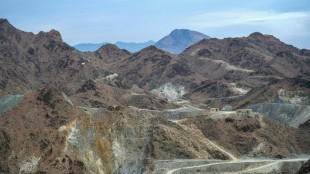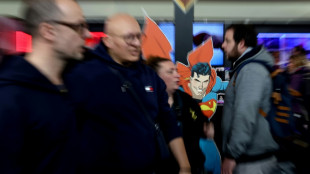
-
 China shrugs off new Trump tariffs but bruising trade war looms
China shrugs off new Trump tariffs but bruising trade war looms
-
Is it Beyonce's time? Music's A-listers ready for the Grammys

-
 Swiss champion Schmid wins Cadel Evans Road Race in scorching heat
Swiss champion Schmid wins Cadel Evans Road Race in scorching heat
-
Cash-keen Taliban betting on Afghanistan's mines

-
 Seeking light in dark times four years after Myanmar coup
Seeking light in dark times four years after Myanmar coup
-
Autos, electronics: What will Trump's tariffs impact?

-
 Three things we learned in the Six Nations
Three things we learned in the Six Nations
-
Russia and Ukraine trade blame for attack on Kursk school

-
 For world's poorest, fears for long-term setbacks after Trump aid cut
For world's poorest, fears for long-term setbacks after Trump aid cut
-
Chappell Roan: the splashy pop supernova

-
 Has Trump changed tack on Venezuela?
Has Trump changed tack on Venezuela?
-
Trump unveils sweeping US tariffs on Canada, Mexico, China

-
 McIlroy and Lowry charge at Pebble Beach but Straka leads
McIlroy and Lowry charge at Pebble Beach but Straka leads
-
Russian attacks on Ukraine kill 15

-
 Japan beat Britain in Davis Cup as Danish rally stops Serbia
Japan beat Britain in Davis Cup as Danish rally stops Serbia
-
US unveils sweeping tariffs on Canada, Mexico, China

-
 Kim holds on to lead at LPGA season-opener
Kim holds on to lead at LPGA season-opener
-
Thousands of Argentines march in defense of diversity

-
 Real Madrid fall at Espanyol as Atletico cut Liga gap
Real Madrid fall at Espanyol as Atletico cut Liga gap
-
Ex-Charlie Hebdo artist wins top prize at comics festival

-
 At least 56 killed as fighting grips Sudan's capital
At least 56 killed as fighting grips Sudan's capital
-
Russian attacks on Ukraine kill 14

-
 Netanyahu to begin talks on 2nd phase of Gaza truce
Netanyahu to begin talks on 2nd phase of Gaza truce
-
Doris proud as faltering champions Ireland beat England in Six Nations opener

-
 Swiss Britschgi wins European figure skating gold
Swiss Britschgi wins European figure skating gold
-
Trump tariff deadline looms, Canada told levies coming Tuesday

-
 Russian attacks on Ukraine kill 13
Russian attacks on Ukraine kill 13
-
US Democrats anoint new leader to take on Trump for 'working people'

-
 Atletico beat Mallorca to stay on Real Madrid's tail
Atletico beat Mallorca to stay on Real Madrid's tail
-
Ireland start Six Nations title defence with gritty England win

-
 Ireland start Six Nations title defence with England win
Ireland start Six Nations title defence with England win
-
Serbia protesters mark three months since deadly roof collapse

-
 Japan beat Britain in Davis Cup as Serbia lose to Denmark
Japan beat Britain in Davis Cup as Serbia lose to Denmark
-
Egypt's Sisi tells Trump world 'counting on' him for Middle East peace

-
 Pakistan separatist militants kill 18 paramilitaries in ambush
Pakistan separatist militants kill 18 paramilitaries in ambush
-
In-form Dembele hits hat-trick again as PSG thump Brest

-
 At least 56 killed as fighting grips greater Khartoum
At least 56 killed as fighting grips greater Khartoum
-
Toll rises to 7 dead, 19 hurt in Philadelphia plane crash

-
 Scots held nerve to beat Italy, says satisfied Townsend
Scots held nerve to beat Italy, says satisfied Townsend
-
Salah takes Liverpool nine clear, Forest hit Brighton for seven

-
 Serbia protesters mark three-months since roof collapse with mass rally
Serbia protesters mark three-months since roof collapse with mass rally
-
Bayern survive late Kiel fightback to go nine points clear

-
 Salah's controversial penalty fires Liverpool nine points clear
Salah's controversial penalty fires Liverpool nine points clear
-
Russia fires deadly barrage on Ukraine as it presses on key city

-
 Jones hat-trick secures Scots opening Six Nations win over Italy
Jones hat-trick secures Scots opening Six Nations win over Italy
-
Trump tariff deadline looms over Canada, Mexico, China trade

-
 Hamas and Israel complete fourth Gaza ceasefire swap
Hamas and Israel complete fourth Gaza ceasefire swap
-
Ex-England coach Lancaster leaves Racing 92

-
 Wood hits hat-trick as flying Forest thrash Brighton 7-0
Wood hits hat-trick as flying Forest thrash Brighton 7-0
-
Horst Koehler, German ex-president and IMF chief, dead at 81

| CMSD | -1.59% | 23.84 | $ | |
| RBGPF | 100% | 67.27 | $ | |
| CMSC | -0.89% | 23.47 | $ | |
| SCS | -1.39% | 11.48 | $ | |
| VOD | -0.82% | 8.54 | $ | |
| GSK | -0.26% | 35.27 | $ | |
| RIO | -0.83% | 60.41 | $ | |
| NGG | -0.55% | 61.4 | $ | |
| BTI | -0.1% | 39.64 | $ | |
| BP | -1.77% | 31.06 | $ | |
| RELX | -0.92% | 49.89 | $ | |
| BCC | -1.98% | 126.16 | $ | |
| RYCEF | -0.81% | 7.43 | $ | |
| BCE | -0.46% | 23.79 | $ | |
| AZN | -0.68% | 70.76 | $ | |
| JRI | -0.32% | 12.53 | $ |

Turkey halts four-month streak of rate cuts
Turkey's central bank on Thursday bowed to market pressure and halted a four-month streak of interest rate cuts that saw inflation soar and the currency collapse.
The bank left its policy rate at 14 percent two days after President Recep Tayyip Erdogan -- a fervent opponent of high interest rates -- said future reductions could come "gradually and without any rush".
Erdogan has been waging a "war of economic independence" designed to break Turkey's dependence on foreign currency inflows by boosting cheap lending and revving up exports.
But the policies have seen the emerging country's economy spin dangerously out of control.
Turkey's annual inflation rate has shot to a 19-year high of 36 percent and is expected to keep climbing.
The lira lost 44 percent of its value against the dollar and became the world's worst-performing emerging market currency last year.
And the central bank's net reserves -- a gauge of both Turkey's economic health and ability to withstand a potential banking crisis -- have dropped from $21.1 billion (18.6 billion euros) in mid-December to $7.9 billion on January 7.
"The sharp falls in the lira risk entrenching inflation at very high levels," Jason Tuvey of Capital Economics said in a note to clients.
"And the weak lira could cause vulnerabilities in the banking sector to crystallise."
- 'Bad policy for longer' -
Erdogan has cited Islamic rules against usury to justify his belief that high interest rates cause inflation. Economists almost universally agree that the opposite is true.
Central banks hike rates in order to raise the cost of doing business when the economy is growing too fast. This helps bring down prices by reducing demand.
High rates also help support currencies by raising the return on local bank deposits and investments.
But Erdogan says Turkey has developed a "new economic model" for achieving sustainable growth.
The central bank attributed the spike in inflation from 21.3 percent in November to 36.2 percent last month to "distorted pricing behaviour (caused by) unhealthy price formations in the foreign exchange market".
It also blamed outside factors such as high commodity prices and global supply chain bottlenecks caused by the coronavirus pandemic.
The lira edged up slightly after the announcement to around 13.3 to the dollar.
Economists believe the bank would need to hike its policy rate substantially in order to solve Turkey's accumulating problems.
"No change (means) bad policy for longer," emerging markets economist Timothy Ash of BlueBay Asset Management remarked after the rate decision.
- 'Lira is our money'
Turks had been converting their liras into gold and dollars in order to shield themselves from price increases and an erosion of their purchasing power.
The government has tried to stem this tide by creating new bank deposits that effectively tie the value of the lira to the dollar.
Erdogan says the new scheme has attracted 163 billion liras ($12.2 billion).
He has also appealed on Turks' sense of patriotism while urging them to hold on to their liras.
"The Turkish lira is our money," he said in a traditional New Year's Eve address. "That is how we move forward -- not with this or that currency."
Yet fresh data released on Thursday showed that 62.2 percent of all Turks' deposits were still held in dollars.
The figure was down by just 1.4 percentage points on the week.
Economists believe that the mechanism is having only a marginal effect because it forces individuals and businesses to hold liras in the new deposits for at least three months.
Exporters are also unhappy with a new requirement to sell a quarter of their hard currency proceeds to the central bank.
K.Thomson--BTB
